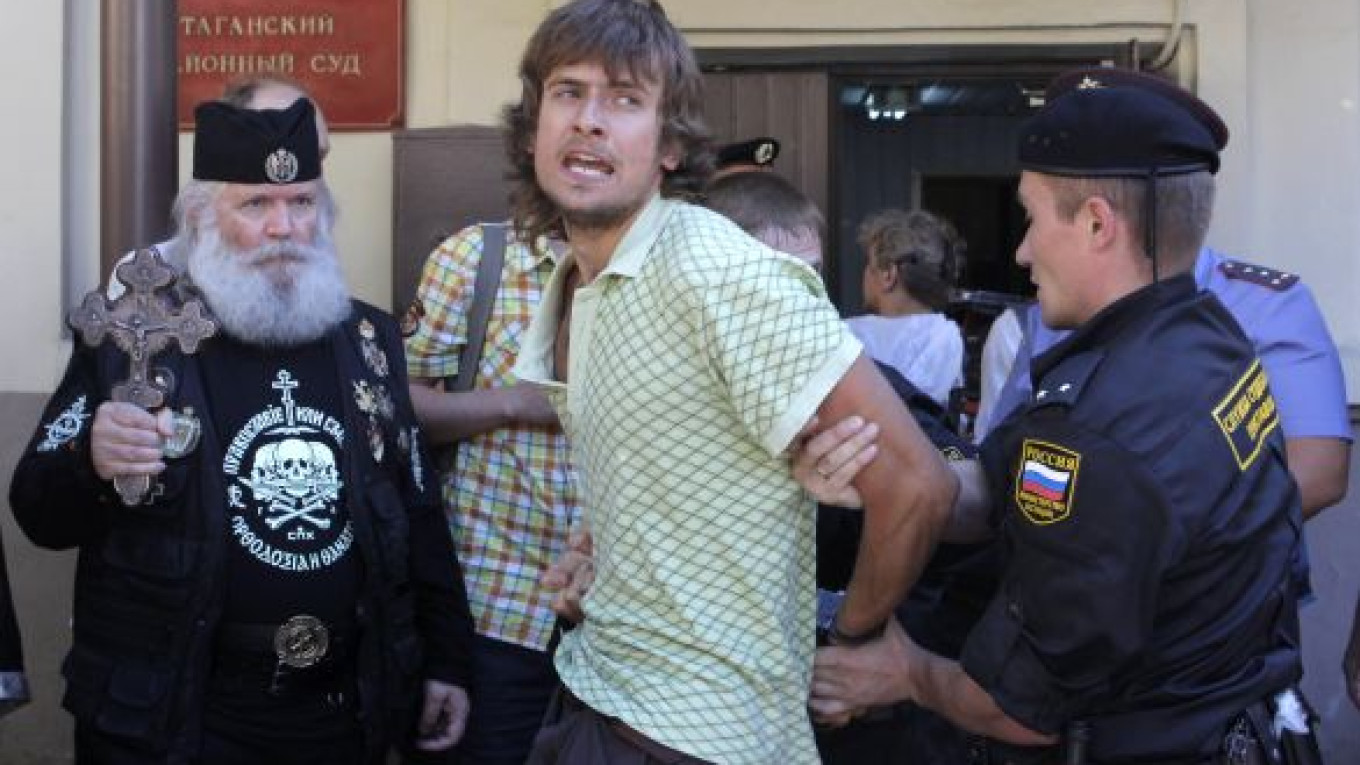A Moscow court convicted two art curators of inciting religious hatred by organizing an exhibit that included paintings depicting Jesus as Mickey Mouse and Lenin and slapped them with heavy fines, widening a rift between the secular and religious communities.
The verdict in the highly publicized case appeared to satisfy no one, with the artistic community seeing it as an infringement on free speech, and Russian Orthodox believers, who had hoped for a prison sentence, saying the fines were too lenient.
A group of artists protested the charges by trying to release thousands of cockroaches in the court building before Monday's hearing.
The stunt was organized by Voina, a radical artist group that made headlines in June for painting a giant penis on a St. Petersburg bridge.
Seven activists, some not affiliated with Voina, were involved in the stunt. Two Voina members, Pyotr Verzilov and Anastasiya Rybachenko, were detained and face unspecified fines, RIA-Novosti reported.
The cockroaches did not delay the Tagansky District Court from handing down the guilty verdicts to Yury Samodurov, former curator of the Sakharov Museum, and Andrei Yerofeyev, former head of the contemporary art department at the Tretyakov Gallery, for inciting religious hatred with their “Forbidden Art” exhibition in 2007.
Samodurov was fined 200,000 rubles ($6,500), while Yerofeyev was fined 150,000 rubles ($4,900).
"The artwork at 'Forbidden Art' is very gross and very offensive for viewers and humiliates their sense of human dignity," judge Svetlana Aleksandrova told dozens of Russian and foreign reporters crammed into the small courtroom.
Aleksandrova scolded Samodurov for not anticipating the charges, given his 2005 conviction on identical charges for an exhibition titled "Watch Out, Religion!" Samodurov was fined 100,000 rubles ($3,220) in that case.
Samodurov "could have predicted the negative reaction of people to the exhibit in light of his previous sentence," she said.
But Aleksandrova said she refused to send the defendants to prison. "The convicts can mend their ways without isolation from society," she said.
The verdict was met with thin applause from the audience.
Supporters gave flowers to Samodurov as he, ringed by reporters and television cameras, left the court building. But a dozen Russian Orthodox activists, mainly long-haired men in church robes and elderly women in head scarves, chanted, "Shame, shame."
A smiling Samodurov ignored the chanters as he told reporters that he would appeal.
"Both religious and nonreligious conscience exist in our society, and they have equal rights," Samodurov said. "It is horrible to ban this with a court order."
His co-defendant, Yerofeyev, said the court ruling "closes the possibility of showing art to society," RIA-Novosti reported.
"Art will not suffer from it, but society will," Yerofeyev said, adding that he feared nervous artists would now feel inclined to consult with the Orthodox church before publishing their works.
The Russian art world largely criticized the court for not acquitting the curators.
Dmitry Vrubel, a prominent Moscow artist, said by telephone that he was glad that Samodurov and Yerofeyev were not jailed but criticized the state for "taking sides in an ideological dispute and opening criminal cases for ideological views."
Independent art historian Anastasiya Yurchenko called the sentence "an awful precedent allowing authorities to punish an artist for simply expressing his views."
Moscow artist Lena Hades —herself accused of inciting ethnic hatred for a painting depicting Russia's double-headed eagle holding a vodka bottle, an anti-Semitic banner, a sputnik and a Dostoevsky book — called the sentence "a bad omen for the future."
Critics of the exhibition — mainly Orthodox groups — complained that Monday's verdict would not discourage the production of similar artwork.
"If a criminal doesn't get adequate punishment, he doesn't feel his guilt to the fullest and will continue to commit crimes," said Oleg Kassin, leader of the radical Orthodox group People's Assembly, Interfax reported.
Leonid Simonovich-Nikshich, head of another radical group, the Union of Orthodox Church Banner-Bearers, told The Moscow Times outside the court that he had backed the prosecutors' request that Samodurov and Yerofeyev be sentenced to three years in prison.
"One mustn't blaspheme," he said.
The church appeared to share this sentiment. Tikhon Shevkunov, the secretary of the patriarch's cultural council who is thought to be Prime Minister Vladimir Putin's personal priest, said he was disappointed with the "purely symbolical" fine.
But Russia's chief rabbi, Berl Lazar, and ombudsman Vladimir Lukin spoke in support of the defendants. Culture Minister Alexander Avdeyev also backed the curators last week, saying the exhibit merited public criticism but not criminal charges.
Renowned Moscow-based art curator Marat Gelman, who also heads the Museum of Modern Art in Perm, called the verdict a relief.
"With no threat of a prison term, we can hold discussions in a normal atmosphere," Gelman said by phone.
Gelman promised earlier to replicate the "Forbidden Art" exhibition in his own Moscow gallery if Samodurov and Yerofeyev lost. But he said Monday that he had changed his mind.
"We need to do our own, equally sharp exhibits," he wrote on his blog.
A Message from The Moscow Times:
Dear readers,
We are facing unprecedented challenges. Russia's Prosecutor General's Office has designated The Moscow Times as an "undesirable" organization, criminalizing our work and putting our staff at risk of prosecution. This follows our earlier unjust labeling as a "foreign agent."
These actions are direct attempts to silence independent journalism in Russia. The authorities claim our work "discredits the decisions of the Russian leadership." We see things differently: we strive to provide accurate, unbiased reporting on Russia.
We, the journalists of The Moscow Times, refuse to be silenced. But to continue our work, we need your help.
Your support, no matter how small, makes a world of difference. If you can, please support us monthly starting from just $2. It's quick to set up, and every contribution makes a significant impact.
By supporting The Moscow Times, you're defending open, independent journalism in the face of repression. Thank you for standing with us.
Remind me later.


